The SSD Relapse: Understanding and Choosing the Best SSD
by Anand Lal Shimpi on August 30, 2009 12:00 AM EST- Posted in
- Storage
Why SSDs Care About What You Write: Fragmentation & Write Combining
PC Perspective's Allyn Malventano is a smart dude, just read one of his articles to figure that out. He pieced together a big aspect of how the X25-M worked on his own, a major key to how to improve SSD performance.
You'll remember from the Anthology that SSDs get their high performance by being able to write to multiple flash die across multiple channels in parallel. This works very well for very large files since you can easily split the reads and writes across multiple die/channels.
Here we go to write a 128KB file, it's split up and written across multiple channels in our tiny mock SSD:
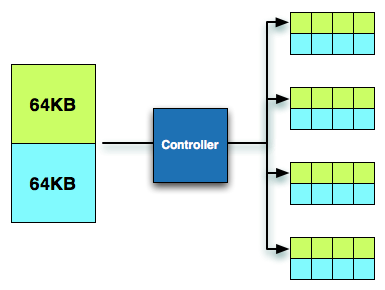
When we go to read the file, it's read across multiple channels and performance is once again, excellent.
Remember what we talked about before however: small file random read/write performance is actually what ends up being slowest on hard drives. It's what often happens on a PC and thus we run into a problem when performing such an IO. Here we go to write a 4KB file. The smallest size we can write is 4KB and thus it's not split up at all, it can only be written to a single channel:
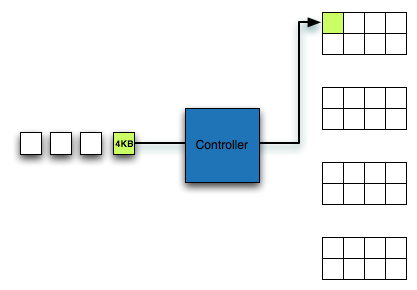
As Alyn discovered, Intel and other manufacturers get around this issue by combining small writes into larger groups. Random writes rarely happen in a separated manner, they come in bursts with many at a time. A write combining controller will take a group of 4KB writes, arrange them in parallel, and then write them together at the same time.
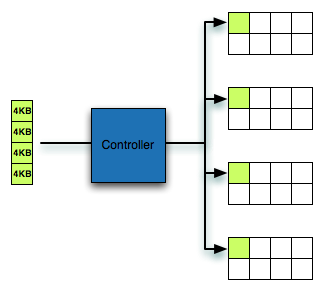
This does wonders for improving random small file write performance, as everything completes as fast as a larger sequential write would. What it hurts is what happens when you overwrite data.
In the first example where we wrote a 128KB file, look what happens if we delete the file:
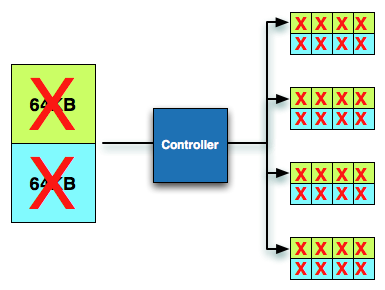
Entire blocks are invalidated. Every single LBA in these blocks will come back invalid and can quickly be cleaned.
Look at what happens in the second example. These 4KB fragments are unrelated, so when one is overwritten, the rest aren't. A few deletes and now we're left with this sort of a situation:
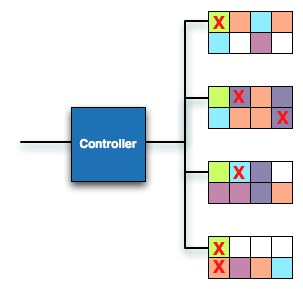
Ugh. These fragmented blocks are a pain to deal with. Try to write to it now and you have to do a read-modify-write. Without TRIM support, nearly every write to these blocks will require a read-modify-write and send write amplification through the roof. This is the downside of write combining.
Intel's controller does its best to recover from these situations. That's why its used random write performance is still very good. Samsung's controller isn't very good at recovering from these situations.
Now you can see why performing a sequential write over the span of the drive fixes a fragmented drive. It turns the overly fragmented case into one that's easy to deal with, hooray. You can also see why SSD degradation happens over time. You don't spend all day writing large sequential files to your disk. Instead you write a combination of random and sequential, large and small files to the disk.










295 Comments
View All Comments
minime - Tuesday, September 1, 2009 - link
Thanks for that, but still, this is not quite a real business test, right?Live - Monday, August 31, 2009 - link
Great article! Again I might add.Just a quick question:
In the article it says all Indilinx drives are basically the same. But there are 2 controllers:
Indilinx IDX110M00-FC
Indilinx IDX110M00-LC
What's the difference?
yacoub - Monday, August 31, 2009 - link
If Idle Garbage Collection cannot be turned off, how can it be called "[Another] option that Indilinx provides its users"? If it's not optional, it's not an option. :(Anand Lal Shimpi - Monday, August 31, 2009 - link
Well it's sort of optional since you had to upgrade to the idle GC firmware to enable it. That firmware has since been pulled and I've informed at least one of the companies involved of the dangers associated with it. We'll see what happens...Take care,
Anand
helloAnand - Monday, August 31, 2009 - link
Anand,The best way to test compiler performance is compiling the compiler itself ;). GCC has an enormous test suite (I/O bound) to boot. Building it on windows is complicated, so you can try compiling the latest version on the mac.
Anand Lal Shimpi - Monday, August 31, 2009 - link
Hmm I've never played with the gcc test suite, got any pointers you can email me? :)Take care,
Anand
UNHchabo - Tuesday, September 1, 2009 - link
Compiling almost anything on Visual Studio also tends to be IO-bound, so you could try that as well.CMGuy - Wednesday, September 2, 2009 - link
We've got a few big java apps at work and the compile times are heavily I/O bound. Like it takes 30 minutes to build on a 15 disk SAN array (The cpu usage barely gets above 30%). Got a 160Gig G2 on order, very much looking forward to benchmarking the build on it!CMGuy - Sunday, October 11, 2009 - link
Finally got an X25-m G2 to benchmark our builds on. What was previously a 30 minute build on a 15 disk SAN array in a server has become a 6.5 minute build on my laptop.The real plus has come when running multiple builds simultaneously. Previously 2 builds running together would take around 50 minutes to complete (not great for Continuous Integration). With the intel SSD - 10 minutes and the bottleneck is now the CPU. I see more cores and hyperthreading in my future...
Ipatinga - Monday, August 31, 2009 - link
Another great article about SSD, Anand. Big as always, but this is not just a SSD review or roundup. It´s a SSD class.Here are my points about some stuff:
1 - Correct me if I´m wrong, but as far as capacity goes, this is what I know:
- Manufacturers says their drive has 80GB, because it actually has 80GB. GB comes from GIGA, wich is a decimal unit (base 10).
- Microsoft is dumb, so Windows follows it, and while the OS says your 80GB drive has 74,5GB, it should say 80GB (GIGA). When windows says 74,5, it should use Gi (Gibi), wich is a binary unit).
- To sum up, with a 80GB drive, Windows should say it has 80GB or 74,5GiB.
- A SSD from Intel has more space than it´s advertised 80GB (or 74,5GiB), and that´s to use as a spare area. That´s it. Intel is smart for using this (since the spare area is, well, big and does a good job for wear and performance over sometime).
2 - I wonder why Intel is holding back on the 320GB X25-M... just she knows... it must be something dark behind it...
Maybe, just maybe, like in a dream, Intel could be working on a 320GB X25-M that comes with a second controller (like a mirror of the one side pcb it has now). This would be awesome... like the best RAID 0 from two 160GB, in one X25-M.
3 - Indilinx seems to be doing a good job... even without TRIM support at it´s best, the garbage cleaning system is another good tool to add to a SSD. Maybe with TRIM around, the garbage cleaning will become more like a "SSD defrag".
4 - About the firmware procedure in Indilinx SSD goes, as far as I know, some manufacturers use the no-jumper scheme to make easier the user´s life, others offer the jumper scheme (like G.Skill on it´s Falcon SSD) to get better security: if the user is using the jumper and the firmware update goes bad, the user can keep flashing the firmware without any problem. Without the jumper scheme, you better get lucky if things don´t go well on the first try. Nevertheless, G.Skill could put the SSD pins closer to the edge... to put a jumper in those pins today is a pain in the @$$.
5 - I must ask you Anand, did you get any huge variations on the SSD benchmarks? Even with a dirty drive, the G.Skill Falcon (I tested) sometimes perform better than when new (or after wiper). The Benchmarks are Vantage, CrystalMark, HD Tach, HD Tune.... very weird. Also, when in new state, my Vantage scores are all around in all 8 tests... sometimes it´s 0, sometimes it´s 50, sometimes it´s 100, sometimes it´s 150 (all thousand)... very weird indeed.
6 - The SSD race today is very interesting. Good bye Seagate and WD... kings of HD... Welcome Intel, Super Talent, G.Skill, Corsair, Patriot, bla bla bla. OCZ is also going hard on SSD... and I like to see that. Very big line of SSD models for you to choose and they are doind a good job with Indilinx.
7 - Samsung? Should be on the edge of SSD, but manage to loose the race on the end user side. No firmware update system? You gotta be kidding, right? Thank good for Indilinx (and Intel, but there is not TRIM for G1... another mistake).
8 - And yes... SSD rocks (huge performance benefit on a notebook)... even though I had just one weekend with them. Forget about burst speed... SSD crushes hard drives where it matters, specially sequencial read/write and low latency.
- Let me finish here... this comment is freaking big.